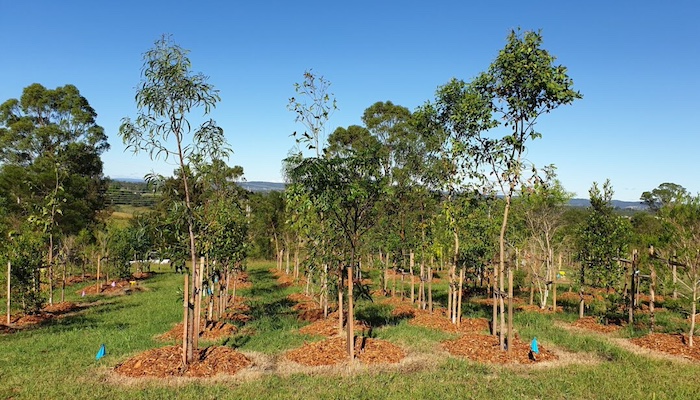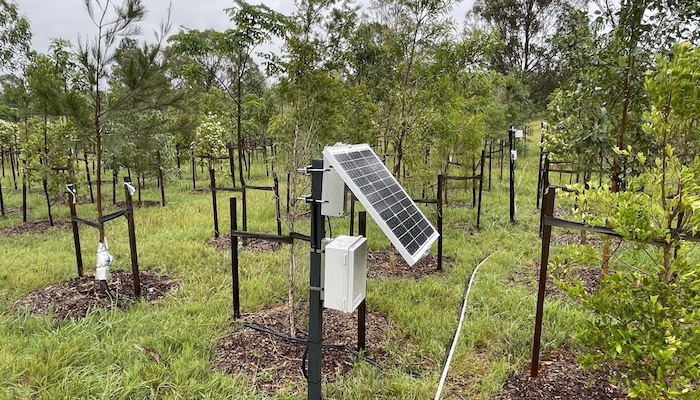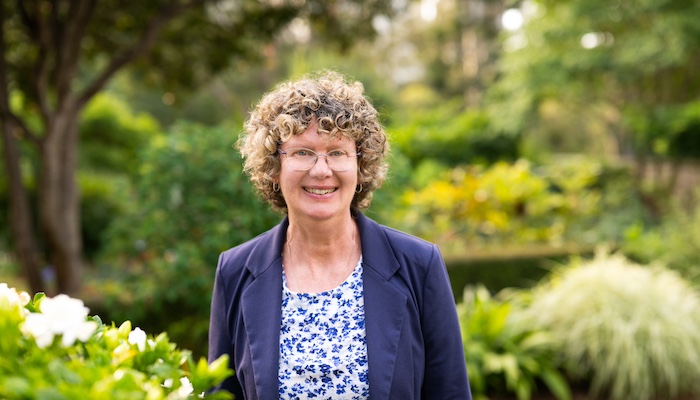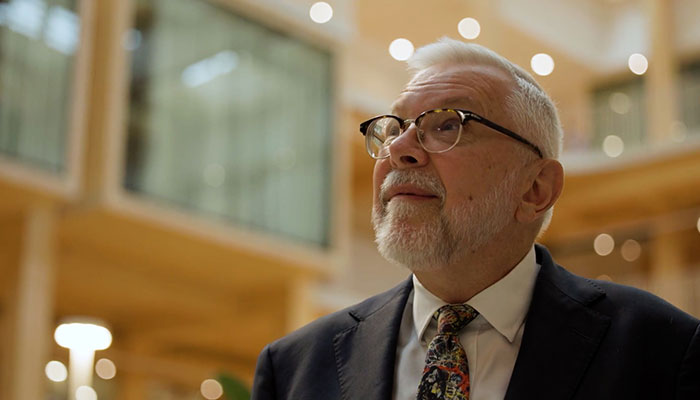On the surface, using recycled water in green space makes sense, solving several problems at once – reducing the strain on fresh water supplies, improving garden health and decreasing the amount of water pumped from treatment plants to the coast and then out to sea.

But in reality it’s not as simple as diverting treated wastewater straight onto gardens, says Distinguished Professor Michelle Leishman; too much treated wastewater could raise the level of underlying groundwater, bringing salt-infused water too close to surface soil, hampering plant growth.
Getting the formula right so soils stay healthy is important before water recycling is introduced on a broad scale, says Professor Leishman, who heads up the new Western City Parklands Arboretum project, funded by Sydney Water in collaboration with Macquarie University’s Smart Green Cities Research Centre.
The project will test the impact of recycled water on different tree species, with a focus on western Sydney’s unique soil and landscape challenges.
The project site at the Australian Botanic Garden at Mount Annan will also feed data into the Which Plant Where online tool, a free resource to future-proof landscaping.
Fifteen different tree species – popularly used as street trees and in parks in the region – are being watered in the Garden with either recycled or drinking-quality water and tested using different soil amendments'.
A one-hectare site has been planted with 600 young trees, with smart monitoring systems and hyper-local weather stations set to take measurements including soil moisture, salinity, temperature and humidity over the next few years.
Sydney's west under the microscope
The core aim of the Western City Parklands Arboretum project is to assess whether recycled water can be used in urban green space in Sydney’s western suburbs.
Not only would the use of recycled water in green infrastructure save significant amounts of drinking water every year, it would also turn the hot western suburbs of Sydney into more liveable, green and sustainable regions, Professor Leishman says.
“Western Sydney is an important place to study when we’re looking to improve functional, healthy green space in cities to provide cooling under extreme heat conditions,” Professor Leishman says.

Making sense: The sensor system at Western City Parklands Arboretum delivers real-time data on soil moisture, salinity, air temperature and humidity.
The region is already well acquainted with the challenges of climate change; Penrith was officially named the hottest place on the planet when the Bureau of Meteorology recorded an air temperature of 48.9°C on 4 January 2020.
Western Sydney routinely has the Sydney Basin’s hottest summer temperatures, recording 44 days over 35°C in both 2018 and 2019 – and the Bureau of Meteorology predicts the proportion of over-35°C days will keep rising.
“Extreme heatwaves and drought are challenging for plants and green spaces, and taxing on limited fresh water resources,” says Professor Leishman.
The project is designed to have a long-term impact on improving the resilience of our urban environments in the face of accelerating warming.
“Using recycled water allows us to use our water resources sustainably to improve our green spaces, so they can provide benefits like cooling, improving air quality and supporting biodiversity.”
Already home to 2.6 million people, NSW Department of Planning and Environment projections suggest another 800,000 people will move to the region by 2041, raising demand for drinking water and straining wastewater infrastructure.
“The new developments needed to house western Sydney’s growing population will produce a large amount of wastewater and sewage that Sydney Water must manage,” Professor Leishman says.
“Treating it and returning it to the landscape for green space maintenance is the proposed solution, but we have to be sure the recycled water won’t cause problems with salinity or plant performance.”
Reducing urban heat islands
The Western City Parklands Arboretum project could ease some of these challenges by providing solid data on the most suitable plants and shade trees for the region, and how best to use the recycled water produced by Sydney Water to reduce the urban heat island effect, Professor Leishman says.
Urban heat islands occur when built-up areas, roads, footpaths and rooftops absorb heat, becoming significantly warmer than those areas which have green spaces to absorb and dissipate the heat.
Rainfall on hard surfaces is often channelled into drains, rather than contributing to soil moisture in any surrounding gardens, which reduces the ability of those gardens to cool.
“There are two ways that trees cool urban areas; first through their shade which reduces the amount of sunlight hitting buildings and roads, keeping the shaded zone cooler,” she says.
“And second, through transpiration which is nature’s air-conditioner - where trees release water vapour into the air through their leaves, and as the vapour evaporates, it absorbs heat from the surrounding air, cooling it down.”
Trees are more effective at transpiration when well-watered and grown in healthy soils which hold moisture, she says.
“In drought or long dry spells, trees don’t provide as much cooling, unless they have been regularly watered, and that’s where recycled water can help.”
Getting the recipe right
Professor Leishman says the project will help develop a ‘recipe for recycling’ for water authorities, planners and landscape architects.

“We need to add enough water to the landscape for trees to perform well, but not add so much we cause the water table to rise and therefore dissolve salts from the layers of soil it passes through, bringing the salt to the surface,” she says.
“We’ll also be looking at the how efficient different tree species are in their water use, and because recycled water has different chemistry to potable (drinking quality) water, we will test interactions with the soil chemistry typical of the region.”
A range of educational material to help residents improve their water management practices will be produced as part of the project, supported by the NSW Government’s Greening our City program.
“We’re also developing on-site guides and education packages for schools and Botanic Garden visitors which are all informed by this research,” says Professor Leishman.
“The project is designed to have a long-term impact on improving the resilience of our urban environments in the face of accelerating warming.”
Distinguished Professor Michelle Leishman from Macquarie University's School of Natural Sciences is the Director of the Smart Green Cities Research Centre.



